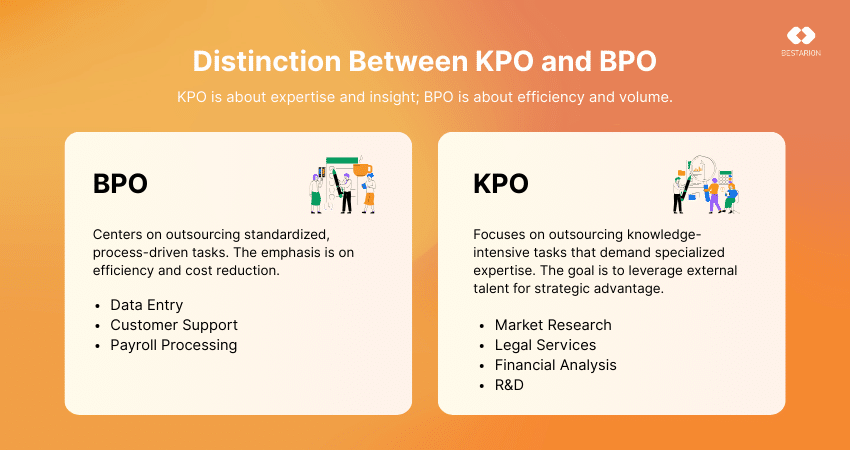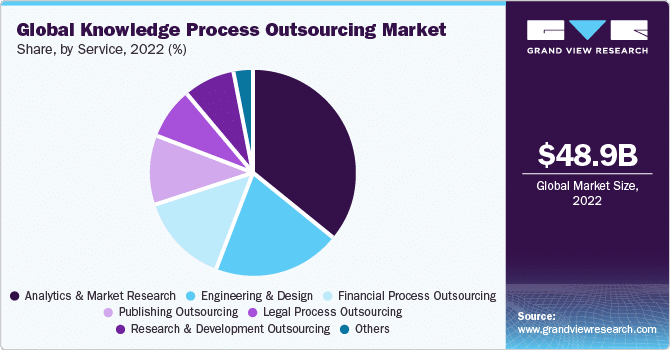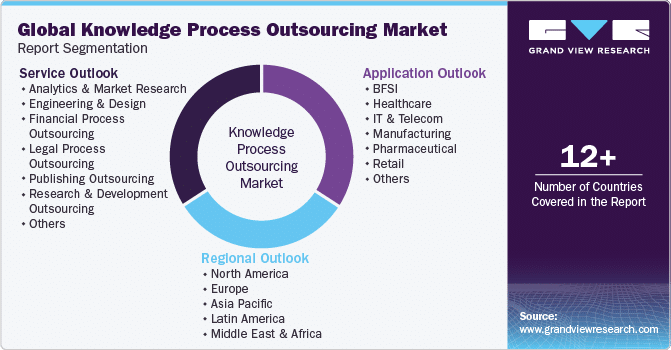The Growing Importance of Knowledge Process Outsourcing (KPO)

In today’s fast-paced and competitive global business landscape, companies are constantly seeking ways to optimize their operations, reduce costs, and enhance their strategic capabilities. One approach that has gained significant traction in recent years is Knowledge Process Outsourcing (KPO). This article delves into the growing importance of KPO, exploring its market dynamics, key drivers, challenges, and future trends. By providing an in-depth analysis, this article aims to offer valuable insights for businesses considering KPO as a strategic solution.
What is Knowledge Process Outsourcing (KPO)?

Knowledge Process Outsourcing (KPO) involves delegating high-level, information-related business activities to external service providers possessing specialized domain expertise. Unlike traditional outsourcing, which focuses on routine tasks, KPO encompasses complex processes requiring advanced analytical and technical skills.
Distinction Between KPO and BPO
While both KPO and Business Process Outsourcing (BPO) involve contracting out business functions, they differ fundamentally in scope and complexity:
-
BPO: Centers on outsourcing standardized, process-driven tasks such as data entry, customer support, and payroll processing. The emphasis is on efficiency and cost reduction.
-
KPO: Focuses on outsourcing knowledge-intensive tasks that demand specialized expertise, including market research, legal services, financial analysis, and R&D. The goal is to leverage external talent for strategic advantage.
Read more: Business Process Outsourcing Provided by Bestarion
Market Dynamics and Growth
The KPO market has witnessed robust growth, driven by the increasing demand for specialized knowledge and cost-effective solutions. Key trends include:
- Market Expansion: According to a report by Grand View Research, the global KPO market size was valued at USD 56.43 billion in 2023 and is projected to reach USD 169.36 billion by 2030, exhibiting a compound annual growth rate (CAGR) of 17.0% during the forecast period. Another report by Coherent Market Insights projects the market to reach USD 103.58 billion by 2032, exhibiting a CAGR of 16% from 2025 to 2032. This growth is attributed to the increasing demand for specialized expertise, cost optimization, and the rising importance of data-driven decision-making across industries.
- Technological Integration: The adoption of advanced technologies such as Artificial Intelligence (AI), Machine Learning (ML), and Robotic Process Automation (RPA) is enhancing the capabilities and efficiency of KPO services.
- Geographical Shifts: While countries like India and the Philippines have traditionally dominated the KPO sector, emerging economies in Eastern Europe and Latin America are becoming increasingly significant players.

Key Drivers of KPO Market Growth
1. Cost Optimization
One of the primary reasons businesses opt for KPO is the potential for significant cost savings. By outsourcing knowledge-intensive tasks to regions with lower labor costs, companies can reduce their operational expenses while accessing high-quality talent. For instance, emerging economies like India, Vietnam, and the Philippines offer a pool of highly skilled professionals who can provide services at a fraction of the cost compared to their Western counterparts.
2. Access to Specialized Expertise
KPO providers offer specialized knowledge and expertise in various fields such as finance, healthcare, legal, and IT. This allows businesses to tap into a global talent pool without the need to hire and train in-house professionals. For example, in the pharmaceutical industry, companies can outsource research and development (R&D) activities to KPO firms, leveraging their expertise in scientific research and analysis.
3. Enhanced Data Analytics and Decision-Making
The proliferation of big data and the growing need for business insights have further fueled the demand for KPO services. KPO providers leverage advanced analytical tools and technologies such as artificial intelligence (AI) and machine learning (ML) to process and analyze large volumes of data, providing actionable insights to businesses. This helps companies make informed decisions, improve operational efficiency, and gain a competitive edge in the market.
4. Focus on Core Competencies
By outsourcing non-core, knowledge-intensive processes, businesses can concentrate on their core competencies and strategic initiatives. This allows them to allocate resources more effectively and drive innovation in their core areas. For example, financial institutions can outsource back-office functions such as financial modeling and market research, enabling their in-house teams to focus on core activities like client relationship management and product development.
Market Segmentation
The KPO market can be segmented based on various factors such as service type, application, and region.
By Service
-
Analytics & Market Research: This segment captured the largest market share in 2023, accounting for 37.8% of the total share. The demand for business intelligence and analytical tools is driving the growth of this segment, as companies seek to gain insights into market trends, consumer behavior, and competitive landscapes.
-
Legal Process Outsourcing (LPO): The LPO segment is anticipated to witness the highest CAGR over the forecast period. Outsourcing legal tasks such as contract drafting, document review, and compliance management helps companies reduce costs while ensuring efficient and accurate services.
-
Financial Analytics: This segment involves outsourcing financial modeling, risk management, and investment research activities. The increasing complexity of financial markets and the need for accurate data analysis are driving the demand for financial analytics services.
By Application
-
BFSI (Banking, Financial Services, and Insurance): The BFSI segment held the largest revenue share in the KPO market in 2023, at 33.5%. Financial institutions rely heavily on KPO services for activities such as market research, financial analytics, and compliance management.
-
Healthcare: The healthcare industry is increasingly adopting KPO services for tasks such as medical research, clinical trial management, and healthcare analytics. The need for accurate data analysis and specialized expertise in healthcare is driving the growth of this segment.
-
IT & Telecom: The IT and telecom sector is projected to record the highest CAGR during the forecast period. The growing complexity and fragmentation of IT and telecom databases are driving the demand for KPO services in this sector.
-
Legal Services: Legal firms outsource services like legal research, contract management, and compliance to KPO providers with specialized knowledge of legal systems and practices, enhancing efficiency and reducing operational costs.
Regional Landscape
-
North America: North America currently dominates the KPO industry, driven by the advanced analytical needs of companies in the region. The presence of a large number of multinational corporations and the demand for high-quality analytical services contribute to the market’s growth.
-
Asia-Pacific: The Asia-Pacific region is expected to be the fastest-growing market for KPO services, led by India and China. These countries offer a pool of highly skilled professionals who can provide cost-effective solutions, making them attractive destinations for KPO.
-
Latin America and Eastern Europe: Nearshoring to Latin America and Eastern Europe is gaining traction, as companies seek proximity to their bases of operations while still benefiting from cost arbitrage. Countries like Mexico and Poland are actively promoting their analytical skills to attract KPO business.
Technological Advancements and Innovation
Technological advancements are playing a crucial role in driving the growth and evolution of the KPO market. The integration of AI, ML, and automation is enabling KPO providers to offer more sophisticated and efficient services. These technologies are transforming various KPO services, such as:
- Legal Outsourcing: AI-driven contract review and compliance management tools are reducing the time and effort required for manual processes, while increasing accuracy.
- Financial Analytics: ML algorithms are improving predictive modeling and fraud detection capabilities, enabling more accurate risk management and forecasting.
- Content Development: Automation tools are enhancing the scalability and global reach of content development services, such as e-learning module creation and translation.
Challenges and Considerations
Despite its numerous benefits, the KPO market also faces several challenges that need to be addressed for sustainable growth.
Data Security and Privacy
One of the major concerns in the KPO industry is data security and privacy. KPO providers handle large volumes of sensitive client data, making them vulnerable to data breaches and cyberattacks. Ensuring robust data security measures and compliance with privacy regulations such as GDPR is crucial for maintaining client trust and protecting against potential legal liabilities.
Intellectual Property Protection
Protecting intellectual property (IP) is another significant challenge in the KPO market. Companies need to ensure that their proprietary knowledge and innovations are safeguarded when outsourcing critical processes. KPO providers must invest in IP protection mechanisms and adhere to strict confidentiality agreements to mitigate this risk.
Workforce Management
The KPO industry relies heavily on a skilled workforce, which can pose challenges in terms of talent acquisition, retention, and training. High attrition rates and the need for continuous upskilling to keep pace with technological advancements are common issues faced by KPO providers. Investing in employee development programs and creating a conducive work environment can help address these challenges and ensure a stable and competent workforce.
Future Trends and Opportunities
Digital Transformation
The ongoing digital transformation across industries is creating new opportunities for KPO providers. As businesses increasingly adopt digital technologies such as cloud computing, Internet of Things (IoT), and blockchain, the demand for KPO services in areas such as digital strategy development, platform design, and cybersecurity is expected to grow. KPO providers can leverage their expertise in these technologies to offer customized solutions that help businesses navigate the digital landscape.
Automation and AI Integration
The integration of automation and AI will continue to be a key trend in the KPO market. KPO providers will increasingly adopt these technologies to enhance the efficiency, accuracy, and scalability of their services. For instance, robotic process automation (RPA) can automate repetitive tasks, freeing up human resources to focus on more complex and strategic functions. The growing adoption of AI and ML will also enable KPO providers to offer more advanced analytical solutions, driving further market adoption.
Sustainability and Environmental Considerations
With increasing global awareness of environmental issues, sustainability is becoming a critical consideration for businesses. KPO providers can play a significant role in helping companies achieve their sustainability goals by offering services such as carbon footprint analysis, sustainable supply chain management, and environmental impact assessment. This presents a new opportunity for KPO providers to diversify their service offerings and contribute to the global sustainability agenda.
Conclusion
The growing importance of Knowledge Process Outsourcing (KPO) cannot be overstated in today’s dynamic business environment. As companies seek to optimize their operations, reduce costs, and enhance their strategic capabilities, KPO offers a compelling solution. The market is experiencing significant growth, driven by factors such as cost optimization, access to specialized expertise, and the increasing importance of data analytics. However, the industry also faces challenges such as data security, IP protection, and workforce management that need to be addressed for sustainable growth.
Looking ahead, the future of KPO looks promising, with trends such as digital transformation, automation, and sustainability creating new opportunities. By leveraging technological advancements and focusing on innovation, KPO providers can continue to deliver value-added services that help businesses thrive in the global marketplace. As the KPO market evolves, it will be crucial for companies to stay informed about market dynamics and trends to make strategic decisions that drive their growth and success.


